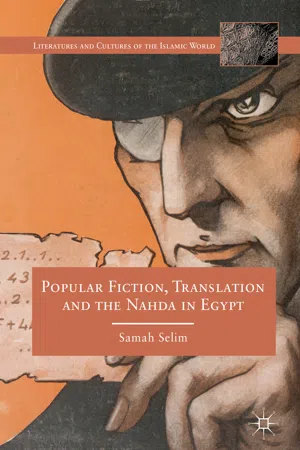To my mind, the more preliminary problem of
nahda lies in its peculiar ambiguity as a term that is both descriptive and
discursive, referring simultaneously to a history and to
a discourse about history that are exceedingly difficult to unwind. In the most basic sense, as a historical period, it is coterminous with the region’s integration into the imperial system and the capitalist world market, when new social and political movements,
literacies, technologies, cultural forms and economic institutions and practices transformed the region. As a discourse about history,
nahda typically institutes a narrative of progress that begins, for better or worse, with Europe and ends in utopias of sovereignty (the authentic or liberal self, the nation-state, the
ʾumma).
2 Stephen Sheehi has aptly described the epistemological contours of this narrative in
Foundations of Modern Arab Identity:
In the formation of modern Arab identity…the Western presence is acknowledged as a necessary mediator for social, cultural and political success and reform. Only Western intervention, specifically the physical and ontological presence of the West, bridges the gap between subjective incompetence and national unity, a gap that the Arab subject alone is allegedly unable to traverse…In their confrontation with the West’s imperialist hopes to control the region directly or indirectly…intellectuals reinscribed the very presence of the powers against which they were struggling…[which] resulted in the entrenching of a master narrative of historical success, cultural failure, and contemporary lack into the analytical apparatuses that generations would use. The West is recognized not only as masterful (in this case, mastering knowledge, social progress and civilization) but also as the eventual mediator of Arab access to, even desire for, these key objects of “concord and unity.”3
And yet, as Jens Hanssen and Max Weiss note, the
nahda (as period) “…was neither a unified process or stable actor-category, nor can it be traced back to a single, incontestable moment of inception,” existing “…before there was a word for it, before that term was invested with various meanings.”
4 The
nahda discourse was largely produced from the nineteenth century onward by and for an intelligentsia thinking and writing at the intersection of orientalist and nationalist epistemes. In their auto-critiques, these
nahdawi reformists, in many ways, reproduced orientalist discourse about the Arab/Muslim world.
5 At the same time, in the 1930s and 1940s, competing and yet intersecting schools of national historiography enshrined
nahda as a telos centered around the triumph of exemplary national elites, whether dynastic or bourgeois liberal.
6 One of the most persistent ideological formations that emerged from the national school of historiography was the conception of an ethnically and culturally homogeneous Egyptian “personality” that either erased the historically plural and polyglot composition of Egyptian society or cast it as a millennial history of occupation by foreigners.
7 In its dominant strains, the
nahda discourse offered a set of disciplinary tools for managing—rather than enabling or accelerating—radical change, what Hoda Yousef refers to as the “caution and conservatism” elicited by the period’s challenges to “the natural social order.”
8 As Omnia El Shakry explains, the “social welfare” project of
nahdawi reformists referred “quite specifically to the social and political process of reproducing particular social relations –often premised on violence and coercion-…in order to ensure the successful reproduction of labor power and to minimize class antagonisms.”
9 As implicit in its very naming,
nahda discourse was backward looking: to golden ages, lost empires and pure languages. The future could only be imagined in terms of a past rooted in languages of power that for the most part considered the cultures and life worlds of the masses with contempt and also with a certain fear. As such
nahda discourse was and continues to be amenable to mobilization by the authoritarian state and the most conservative political and ideological projects.
10